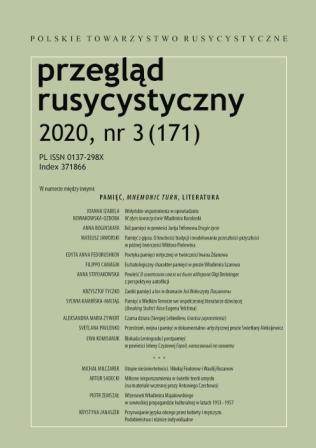Pamięć o Wielkim Terrorze we współczesnej literaturze dziecięcej (Breaking Stalin’s Nose Eugena Yelchina)
The memory of the Great Terror in contemporary children’s literature (based on the Eugen Yelchin’s story Breaking Stalin’s Nose)
Author(s): Sylwia Kamińska-MaciągSubject(s): Russian Literature, Post-Communist Transformation, Theory of Literature, Politics of History/Memory, Sociology of Literature
Published by: Polskie Towarzystwo Rusycytyczne
Keywords: memory; postmemory; children’s literature; Russian literature; The Great Terror;
Summary/Abstract: Even though the motif of the Great Terror is present in Russian literature for children and the youth (not only contemporary, but also that published during the period of the Soviet Union), one could assume that after the fall of communism the need to re-evaluate and revalue the past, and at the same time giving a literary voice to the victims of the Stalinist regime, will increase. However, when Eugen Yelchin’s book Breaking Stalin’s Nose, first released in English in the USA, was translated and made available in print in Russia in 2013, its reading triggered a loud and ongoing public discussion, including voices calling it “anti-Russian.” Therefore, in this article I draw the reader’s attention to how the subject of the Great Terror was and is present in Russian children’s literature. Analyzing it (using the motifs from Breaking Stalin’s Nose as an example) from the perspective of memory and post-memory theory, I would like to point out why one short novel for children provoked so many extreme opinions among adult readers around the world.
Journal: Przegląd Rusycystyczny
- Issue Year: 2020
- Issue No: 171
- Page Range: 90-104
- Page Count: 15
- Language: Polish

